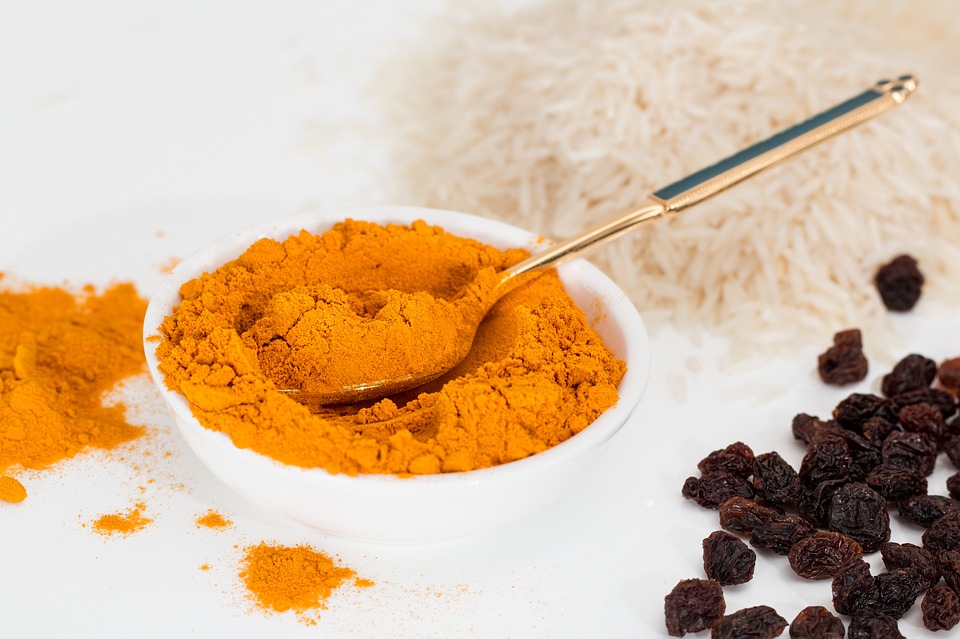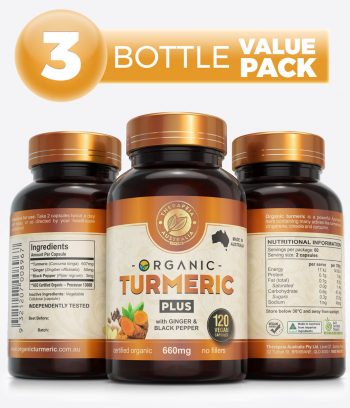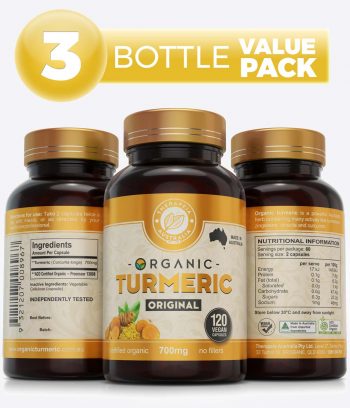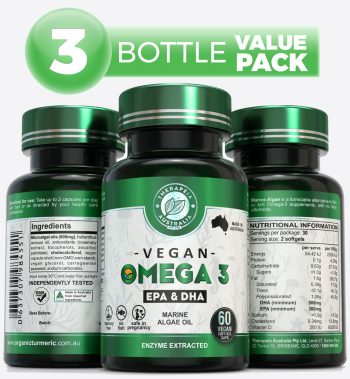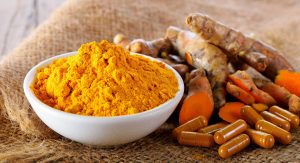For thousands of years, many healers have lauded the powerful health benefits of organic turmeric. Today, plenty of scientists and wellness enthusiasts consider turmeric as one of the most effective nutritional supplements on the planet.
In fact, several studies have proven that taking the right amount of turmeric on a daily basis can bring major benefits to your brain and body.
This article explores the health benefits of this celebrated spice. It also explains how adding this supplement to your diet can bring a greater degree of wellness into your life.
What is Turmeric?
Turmeric is commonly used as a spice, most famously in curry powder. In fact, turmeric is what gives curries their distinctive yellow color. However, it can do a lot more than just pamper your taste buds.
Turmeric is a plant that can be traced back to India. It belongs to the ginger family. Before the western world knew of its potent medicinal properties, it was used for centuries to treat health conditions in India and other parts of Asia.
A few years ago, scientists began to learn about the antioxidant components of turmeric. It was also discovered to be a powerful anti-inflammatory. It even has anti-cancer properties.
15 Amazing Health Benefits of Turmeric
- Helps with Inflammation
- Great for Joints Health
- Good for the Heart
- Helps Balance Cholesterol Levels
- Helps with Stress
- Helps You Fight Depression
- Boosts Your Metabolism
- Beneficial for Weight Loss
- Boosts Your Vitality
- Good for the Brain
- Radiates Your Skin
- Helps Create Good Mood
- Improves Digestion
- Helps Fight Cancer
- Delays Ageing
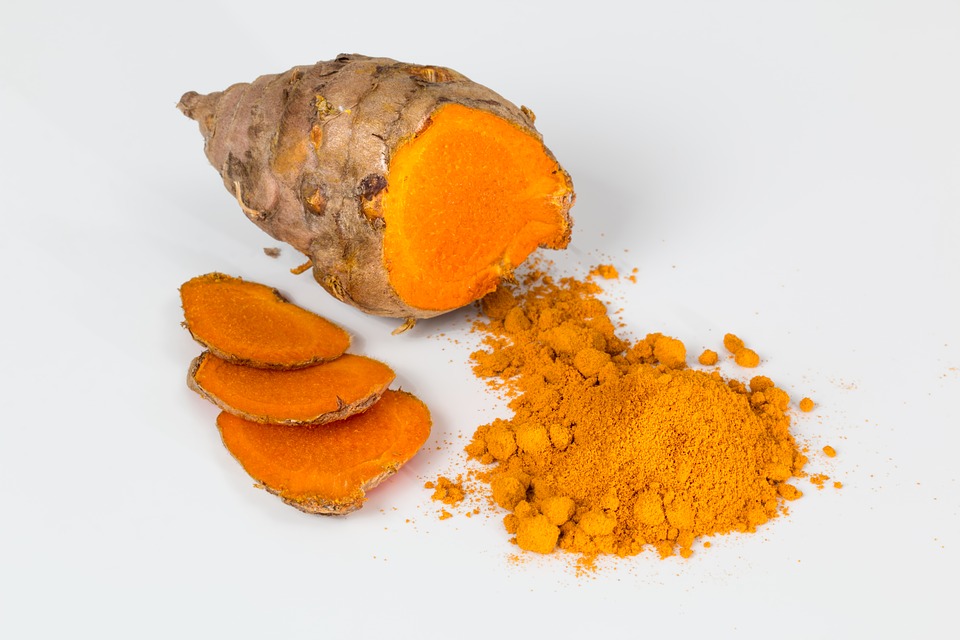
Note that there is a bit of a caveat for women who are pregnant or lactating. Turmeric is safe if you eat amounts commonly found in food. However, it is not recommended to take in medicinal amounts during pregnancy.
This is because turmeric can actively stimulate the uterus. This promotes menstrual periods, which can cause complications during pregnancy. While the safety claims of turmeric for lactating women varies, they are not scientifically proven yet. Thus lactating women would be better off abstaining from this supplement, just to be on the safe side.
Thus, it is not recommended to take in medicinal amounts of it if you are breast-feeding, but it is okay to eat foods containing turmeric during that time.
Turmeric Helps with Inflammation

Short-term and acute inflammation can be helpful for your body to fight foreign invaders, such as bacteria. Conversely, chronic inflammation can be dangerous because it can kill the tissues in your body.
Chronic inflammation is the result of eating too much processed, sugary foods. Heavy drinkers can also suffer from this condition. Inflammation can also leads to other serious diseases, such as Alzheimer’s, heart disease, and cancer.
Fortunately, one of the most common turmeric health benefits is that it helps fight inflammation. This is mainly because of curcumin, which is the most active component in turmeric. Curcumin is highly anti-inflammatory and also a strong antioxidant.
Note that black pepper is a great addition to help your bloodstream absorb curcumin. Black pepper is rich with piperine. This is a natural substance that can enhance your body’s efficient absorption of curcumin.
Turmeric Is Great for Joint Health
 Turmeric benefits the joints by promoting mobility and overall joint health. Since curcumin is anti-inflammatory, it helps keep your joints from being swollen or inflamed.
Turmeric benefits the joints by promoting mobility and overall joint health. Since curcumin is anti-inflammatory, it helps keep your joints from being swollen or inflamed.
One scientific study showed that patients with rheumatoid arthritis (a chronic inflammatory disorder that causes swelling and pain in the joints) can gain relief by taking a 500 milligrams daily dosage of curcumin. In fact, this dosage proved more effective than the typical drug prescription Diclofenac.
Note that turmeric can best support joint health and can better alleviate arthritis pain if taken before the symptoms kick in—like a preventative measure.
Other studies were also able to demonstrate that turmeric can help cure osteoarthritis, a degenerative joint disease.
So, to keep your joints mobile, pain-free, and healthy, take a healthy dosage of turmeric which can be easily taken from the foods that you eat.
Turmeric Is Good for the Heart
 One of the best turmeric health benefits is that its properties promote cardiovascular wellness.
One of the best turmeric health benefits is that its properties promote cardiovascular wellness.
Heart disease is the number one cause of death all over the world—this is mainly due to an unhealthy lifestyle built up for years or due to genetics.
Also, chronic inflammation is the most common player in heart attacks. So, turmeric having a super active anti-inflammatory component is such a helpful supplement in fighting cardiovascular threats.
Did you know that curcumin can also improve the lining of blood vessels? This is very important because if your endothelium does not properly work, your blood pressure cannot be regulated. This often results in blood clotting and heart disease.
Turmeric Helps Balance Cholesterol Levels
 A turmeric supplement can reduce oxidative stress which is the main driver of high cholesterol levels. Oxidative stress often happens in your body due to high blood sugar and inflammation. So, if you reduce your sugar intake and then take turmeric to reduce inflammation in your body, your cholesterol will hit and remain at a healthy level.
A turmeric supplement can reduce oxidative stress which is the main driver of high cholesterol levels. Oxidative stress often happens in your body due to high blood sugar and inflammation. So, if you reduce your sugar intake and then take turmeric to reduce inflammation in your body, your cholesterol will hit and remain at a healthy level.
One study concluded that curcumin in turmeric is as effective as the prescription drug Lipitor, which is recognised to reduce inflammation, alleviate oxidative stress, and help with endothelial dysfunction.
Another study also found that a 500-milligram daily dose of curcumin dropped the participants’ total cholesterol levels by an impressive rate of 11.63%, while increasing their high-density lipoprotein (HDL) levels up to 29% in just 7 days. HDL, by the way, is also known as good cholesterol.
Turmeric Helps with Stress
 Turmeric is also an adaptogen which can help soothe the harmful effects of everyday stress to your body. It can also boost your stress tolerance.
Turmeric is also an adaptogen which can help soothe the harmful effects of everyday stress to your body. It can also boost your stress tolerance.
Adaptogens in herbal medicine have the ability to moderate the release of stress hormones from your adrenal glands. As a result, this makes you become more resilient to anything that comes your way because you can now easily adapt to most emotional and physical stress. Plus, adaptogens help you keep balanced hormones.
A 2011 study in India found that several adaptogenic properties in turmeric are so efficient in decreasing the secretion of stress hormones in the body and in maintaining healthy stress hormone levels. Plus, it helps maintain good body weight, blood sugar, and good memory.
Turmeric Helps Fight Depression
 One of the most incredible turmeric benefits is its ability to help fight depression. Depressed people often suffer from reduced levels of brain-derived neurotrophic factor (BDNF). BDNF is a protein usually found in the spinal cord.
One of the most incredible turmeric benefits is its ability to help fight depression. Depressed people often suffer from reduced levels of brain-derived neurotrophic factor (BDNF). BDNF is a protein usually found in the spinal cord.
Curcumin found in turmeric is believed to boost BDNF levels and can even potentially reverse degradation. Studies show that it has the ability to boost the neurotransmitters of dopamine and serotonin, which are brain chemicals that can prevent depression.
Another study concluded that curcumin is just as effective as well-known antidepressant prescription drugs. It tested 60 people with diagnosed depression and divided them into three small groups.
Group 1 participants were given Prozac, while group 2 were given one milligram of curcumin. Group 3 members were asked to take both Prozac and curcumin. The results favoured the group that took both medicines.
Turmeric Boosts Your Metabolism
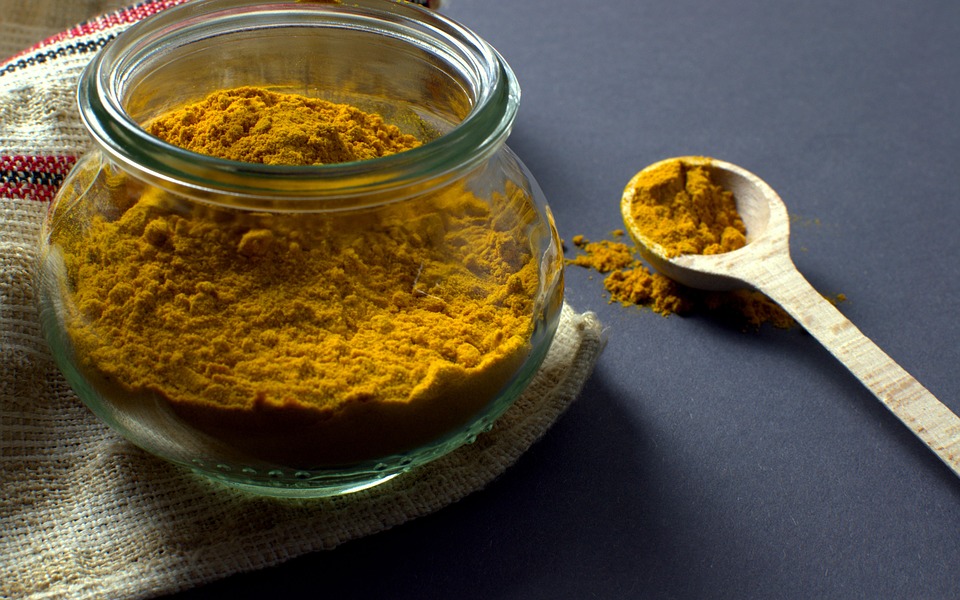 Turmeric benefits the metabolism by maintaining normal blood sugar levels in your body. That’s a big reason why turmeric has been used to cure diabetes in both traditional Chinese and Ayurvedic medicine.
Turmeric benefits the metabolism by maintaining normal blood sugar levels in your body. That’s a big reason why turmeric has been used to cure diabetes in both traditional Chinese and Ayurvedic medicine.
This is because curcumin can effectively stabilise glucose levels in the blood which also helps in aiding complications that are related to diabetes. This came from a review of an actual scientific study conducted in 2013.
In another study that tested a hundred people who were overweight and with type 2 diabetes, participants were given a choice to take either 300 milligrams of curcumin or a placebo tablet for 12 weeks. The result has shown that the participants who took 300 milligrams of curcumin on a daily basis for 12 weeks have significantly lowered their fasting blood glucose level.
Also, another research suggested that curcumin can reduce the risk of developing diabetes even in high-risk individuals. In this 2012 study, the participants who took turmeric supplement, which is rich in curcumin extract, for 9 months were not able to develop diabetes even though there were already prediabetic! On the other hand, 16% of the prediabetic participants in this research has unfortunately developed diabetes after 9 months of taking a placebo tablet.
Turmeric Promotes Weight Loss
 This is probably one of the most attractive turmeric health benefits. Taking a turmeric supplement supports weight loss.
This is probably one of the most attractive turmeric health benefits. Taking a turmeric supplement supports weight loss.
For overweight people, curcumin in turmeric can be your new best friend because it effectively influences weight management through its ability to reduce stress and diminish growth of fat cells.
Did you know that elevated stress is the major factor that drives sudden weight gain? When your stress hormones rapidly increase, your fat accumulates near your stomach because your stomach cells are really sensitive to high cortisol, which is a steroid hormone that stimulates stress.
So, as turmeric balances your stress hormones, it also helps you shred out some extra weight that is often found around your waist.
Turmeric Boosts Your Vitality
 Vitality is very important if you want to become the best at anything that you do, especially if you want to produce the highest-quality output at work. Turmeric supplements can help you optimise your vitality.
Vitality is very important if you want to become the best at anything that you do, especially if you want to produce the highest-quality output at work. Turmeric supplements can help you optimise your vitality.
Turmeric has powerful antioxidant properties that can fight excess free radicals that enter your body, damage your cells, and eventually diminish your health.
As you may already know, free radicals in the body can lead to neurodegenerative disorders, cancers, and other serious disorders. So, if you consume lots of processed foods, you will need more antioxidants, such as curcumin in turmeric.
Also, curcumin is known to boost the enzymes for antioxidants in your body—this gives you even more benefits.
Turmeric Is Good for the Brain
 Taking a turmeric supplement helps maintain healthy cognitive functions. This is because (as already mentioned) curcumin can effectively boost the BDNF brain protein, which is crucial for brain growth.
Taking a turmeric supplement helps maintain healthy cognitive functions. This is because (as already mentioned) curcumin can effectively boost the BDNF brain protein, which is crucial for brain growth.
BDNF helps form new connections and neurons—these are two of the most important brain components that you need as you get older.
Imagine BDNF as something that builds a smooth path inside your brain so neurotransmitters, such as dopamine and serotonin, can easily travel where they need to go to keep your mental health at its best.
Now, remember that high BDNF levels create a good mood and better memory, while low BDNF levels increase the risk of depression and Alzheimer’s disease.
So, to increase the levels of BDNF brain hormone, make sure to take the right amount of curcumin in turmeric on a daily basis. Also, throw in some physical and mental exercises into the equation.
Turmeric Improves Skin Health
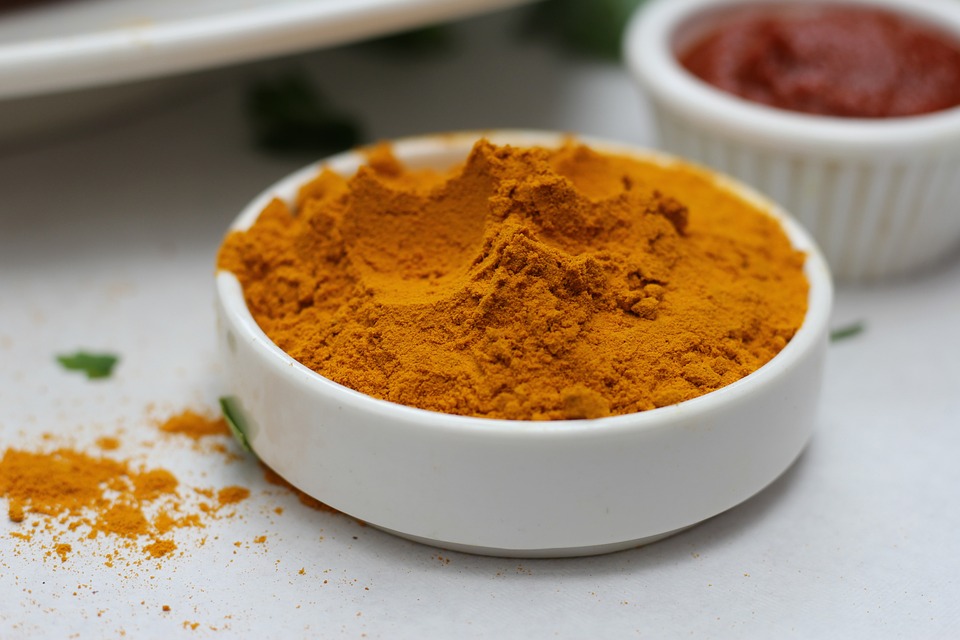 Turmeric supplements benefit the skin and helps your body produce a healthier, more radiant complexion. This is because turmeric is a powerful antioxidant. By fighting off oxidative damage, it boosts the overall glow and look of your skin. Indeed, turmeric is a powerhouse for anti-ageing elements in medicinal herbs.
Turmeric supplements benefit the skin and helps your body produce a healthier, more radiant complexion. This is because turmeric is a powerful antioxidant. By fighting off oxidative damage, it boosts the overall glow and look of your skin. Indeed, turmeric is a powerhouse for anti-ageing elements in medicinal herbs.
Plus, a study in 2016 found that turmeric can improve several skin conditions when it’s directly applied to the skin or ingested.
In fact, for hundreds of years, people around the world have associated turmeric with cosmetic benefits and healing benefits for the skin.
Turmeric Helps to Improve Your Mood
 As you already know, curcumin (the most active ingredient in turmeric) can boost levels of BDNF, which is a protein that helps build our brain. If you have high levels of BDNF, you are less likely to experience depression and sudden mood swings.
As you already know, curcumin (the most active ingredient in turmeric) can boost levels of BDNF, which is a protein that helps build our brain. If you have high levels of BDNF, you are less likely to experience depression and sudden mood swings.
Plus, curcumin can also boost the “happy” chemicals in your brain, which are dopamine and serotonin.
Remember the study of 60 depressed people we mentioned above? They were randomised into three groups—the first group only took Prozac, the second group only took 100 milligrams of curcumin, and the last group took both.
The results showed that those who only took curcumin have far better results than those that only took Prozac. However, the group that took the combination of Prozac and curcumin had even better results.
Turmeric Improves Digestion
 For many years, turmeric is used in Ayurveda as one of the herbal medicines that help aid gut inflammation and improve digestion—this has been made possible by curcumin, which is the active anti-inflammatory ingredient in turmeric.
For many years, turmeric is used in Ayurveda as one of the herbal medicines that help aid gut inflammation and improve digestion—this has been made possible by curcumin, which is the active anti-inflammatory ingredient in turmeric.
Also, curcumin can stimulate your gallbladder, so it can help produce bile which is important in breaking down food intake.
Some researchers also found out that curcumin can actually help people with ulcerative colitis, which is an inflammatory disease of the bowel that often causes digestive tract sores.
Turmeric Helps Fight Cancer
 This might be one of the most important turmeric health benefits. Curcumin has anticancer properties that can reduce the spread of cancer cells and even inhibit tumor growth.
This might be one of the most important turmeric health benefits. Curcumin has anticancer properties that can reduce the spread of cancer cells and even inhibit tumor growth.
An animal study on the use of curcumin has shown that it has the capacity to kill cancer cells or tumor cells.
Now, talking about preventing cancer before it starts, there is another study conducted on humans which concluded that taking 4 grams of curcumin on a daily basis has reduced the number of precancerous lesions in the colon, down to 40%. The research also suggested that curcumin can be most beneficial in fighting skin, breast, stomach, and colon cancer.
A different study conducted in 2017 has found that curcumin can improve the beneficial effects of chemotherapy treatment for colon cancer—this is due to curcumin enhancing the tumor’s sensitivity to chemotherapy. Most importantly, curcumin is also found to aid in combating chemo-resistance in patients.
Turmeric Delays Aging
 People in their middle age and even seniors would love this turmeric benefit! Inflammation and oxidation are believed to play active roles in ageing, but curcumin can help fight age-related chronic diseases, such as rheumatoid arthritis and heart disease.
People in their middle age and even seniors would love this turmeric benefit! Inflammation and oxidation are believed to play active roles in ageing, but curcumin can help fight age-related chronic diseases, such as rheumatoid arthritis and heart disease.
Most importantly, curcumin is fully packed with anti-ageing components that can delay your ageing if you regularly consume turmeric in healthy doses.
Is It Safe to Take Turmeric Every Day?
Yes, it is!
In fact, plenty of studies have recommended taking a daily dose of 500 to 2,000 milligrams of turmeric. This is often in a form of curcumin extract with a concentration that is a bit higher than the amounts that you can naturally get from eating foods with turmeric as an ingredient.
The typical ingredients that are commonly found in Indian dishes usually have 2,000 to 2,500 milligrams of turmeric per day, including around 60 to 100 milligrams of curcumin—the most active and most beneficial property of turmeric in terms of health.
On the other hand, most curcumin extracts that are often considered as “turmeric supplements” typically have 1,900 to 2,375 milligrams of curcumin.
So, the natural turmeric spice normally contains 3% of curcumin, while curcumin extracts contain 95%.
- If you have itchy skin
– Take 500 milligrams of turmeric three times a day for 2 months. - If you have high cholesterol
– Take 700 milligrams of curcumin extract two times a day for 3 months. - If you have osteoarthritis
– Take 500 milligrams of curcumin extract two times a day for 2 to 3 months.
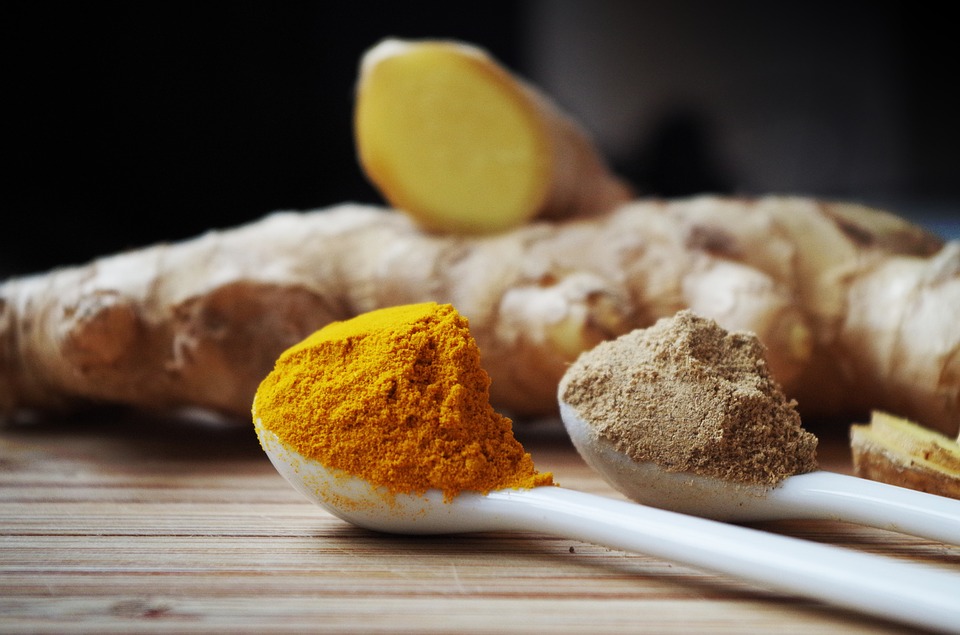
Now, please remember that taking a higher dosage of turmeric and curcumin, an amount that is more than the prescribed milligrams, is highly discouraged because long-term intake of higher dosages has not been studied yet.
On an easier note, the World Health Organization (WHO) has advised the public to take turmeric or curcumin extract for 1.4 milligrams per pound (or 0-3 milligrams per kilogram) of your body weight.
Remember that herbal medicines, such as turmeric supplements, should still be taken with caution. Always inform your healthcare provider of all the supplements that you are taking.
3 Different Types of Turmeric
Each type of turmeric has its own unique benefits. It basically depends on what you want to do with any of these types.
Fresh Turmeric Root
The fresh and organic turmeric root can be found in the produce section in natural food stores. You can also check it in some conventional grocery stores. This type of turmeric is best recommended to be added to a fresh-pressed juice!
Ground Turmeric
This kind of turmeric can be easily found in the spice aisle of almost all grocery stores. This is the best ingredient when seasoning meals, especially vegetable dishes. However, it is highly recommended that you get the organic ground turmeric because some of these spices are grown with synthetic and harmful pesticides.
Turmeric Supplements
This type often comes in capsules and is the most convenient way to ensure that you get the daily dose of turmeric and curcumin that you need.

So, did we miss any type of turmeric that you know about? How about the turmeric benefits that are so beneficial to your health? Did we miss some important points that we should have discussed? Let us know in the comments!
Also, feel free to share this article with your family and friends so they, too, will learn more about the turmeric health benefits. Stay healthy!
